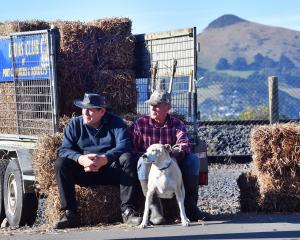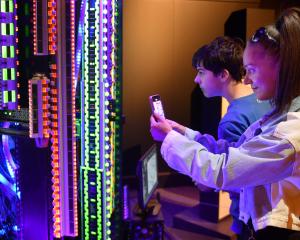Wife Sheryl made him see a doctor, even though she could not pinpoint anything wrong with him.
About 10 years ago, Mr Te Whare (51) was working as a supervisor at the Dunedin Hospital laundry and, lacking energy, went home early.
Although he did not ''feel right'', he decided against seeing a doctor and wanted to sleep.
Mrs Te Whare (51) convinced him to go to the after-hours clinic.
At the clinic, his blood pressure test read 266:199, he said.
''If I'd gone to bed, I wouldn't have woken up ... I should have been dead.''
When they called him an ambulance, he assured medical staff he could walk across the road.
''I thought, 'What's all the hoo-ha about?'''
But in the emergency department, he soon realised he needed help when his legs started cramping.
He had shown signs of a stroke a week earlier.
Mrs Te Whare said she had seen her husband momentarily walk sideways and his speech become slurred.
''But the next moment, he spoke and he was fine . . . there were a couple of signs there but because they came and went so fast, we didn't know what they were.
''Had we known more about them, we would have recognised them and acted faster.''
Mr Te Whare said he had a ''massive'' stroke in his sleep in hospital a few days later, and lost movement on parts of his right side.
''It's been frustrating at times but I'm above ground - onwards and upwards.''
Mr Te Whare said he would be collecting for the Stroke Foundation at the Meridian mall on Thursday and distributing Fast symptom check cards.
Stroke Foundation community adviser Judith Hyslop, of Dunedin, said the foundation had 100,000 Fast cards to distribute so New Zealanders could recognise and remember the three main symptoms.
Research had revealed a third of New Zealanders were unable to recognise a single symptom of stroke. A further one in four could recognise only one symptom. Fewer than one in 10 could name three symptoms.
''We need to change that, to make sure that as many people as possible, with stroke, reach hospital in time to be assessed and receive potentially lifesaving treatment.''
Recognising strokes and seeking medical attention quickly could reduce the unnecessary death toll and disability. Stroke Awareness Week began yesterday.
Strokes
• A stroke is the third-largest killer in New Zealand, after heart disease and cancer.
• About 24 New Zealanders each day suffer a stroke.
• A quarter of strokes happen to people younger than 65.
• More than 2500 people die from strokes annually.
• Disabilities from strokes make it one of the highest consumers of hospital beds, services and community support in New Zealand.
• There are about 60,000 stroke survivors in New Zealand.
• A stroke is a sudden interruption of blood flow to the brain, causing brain cell damage - a brain attack.
• Delayed recognition of a stroke means delayed medical intervention, which can have tragic consequences, including further damage to the brain - or death.
• Strokes can be treated. Up to half of the stroke patients could be treated if they arrive at a hospital within three hours of the stroke's onset.
Fast stroke check
Face: Look at the person's face and ask them to smile; is one side drooping?
Arms: Ask them to raise both arms; is one side weak?
Speech: Ask them to say something simple; are they unable to speak, or are the words jumbled or slurred?
Time: Time to act fast and call 111. Time lost may mean brain lost.












